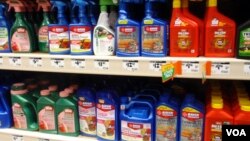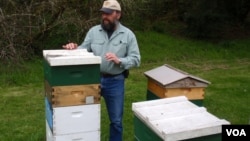OLYMPIA, WASHINGTON —
This is the time of year when farmers in the northern hemisphere count on bees and other insects to pollinate orchards, vegetables and berry fields. But what has the beekeeping world abuzz this season is the continuing phenomenon of mass honeybee deaths — and how governments on two continents are responding to them.
U.S. regulators on Thursday released a scientific report blaming the widespread decline of bees on the combined effects of parasites, viruses, bacteria, poor nutrition and chemical pesticides. For its part, the European Commission announced plans this week to impose a two-year moratorium beginning in December on the use of three popular pesticides judged to pose high risk to bees. Beekeepers and environmental groups are pushing governments in North America to go in that direction, too.
For the past decade, many beekeepers around the world have been plagued by unexplained die-offs in their hives. It recently happened to Mark Emrich, who raises bees on his small farm near Olympia, Washington.
“I was doing great until about five weeks ago,” he said. “Then I came down and opened up the hives and I had five dead boxes of bees. That was a huge hit."
He lost one third of his production.
"It is very hard to deal with bee losses. They are kind of like your little livestock and you try to really manage them and take care of them the best you can. When they die off, you feel that you've failed."
Warnings about pesticides in the garden
Emrich sports a bushy beard and a ball cap with the logo of the Washington State Beekeepers Association. He's the group's president. Even before the die-off in his hives, he was writing letters to government officials, asking that some potentially risky and widely used pesticides be pulled from store shelves.
While U.S. and Canadian environmental health agencies have both announced they will reevaluate the registration of pesticides in question, those processes are slated to take years. Emrich worries that mounting bee colony losses means he can't wait that long, so he and his fellow beekeepers are petitioning county and state governments, calling for local rules to restrict home and garden use of common bug killers, rose and flower treatments, and grub controls.
"We have people who are using it who don't understand all the implications, and the labeling is inadequate as far as what it actually will kill,” Emrich explained. “So basically, the idea is at least we'll get it out of the hands of the general public."
The insecticides in question belong to a class called neonicotinoids. "Neonics," for short, appear in more than a hundred different garden products sold under global brand names such as Bayer, Ortho and Scotts. While a range of studies have shown significant adverse effects on bees exposed to high doses in the lab, separate studies using more realistic field conditions show minimal harm or are inconclusive.
Threats from many directions
Pesticide makers argue that banning neonics would not save a single hive. Barb Glenn, who oversees science and regulatory affairs for the industry association CropLife America, pointed out, "If we use these products according to the label, then we don't see an effect on pollinators — or honey bees — that are contiguous to these fields where we're using these products."
Glenn says it is in her industry's best interest to safeguard bees because agriculture needs pollinators to thrive. In her view, many factors conspire against bee survival: diseases, parasites, the availability of habitat, the practices of the beekeeper, and their own nutrition.
“Pesticide use is also a part of that continuum," she added.
Glenn's list looks almost the same as ones compiled by independent researchers with Britain’s Insect Pollinators Initiative, and by scientists at Oregon and Washington state Universities.
WSU entomologist Steve Sheppard said a lot of new research is focusing on the pesticide angle.
"There's not a consensus I think in the scientific community that the levels that are found in agricultural crops, for example, have been directly linked to colony losses," he said. "But some countries — in Europe, for example — have taken a more prudent approach to not use those pesticides until they feel all of the data are in."
That's also the gist of a petition for rulemaking before the Washington State Department of Agriculture. The department's initial response was to ask all affected parties to send in their best science. The state plans to announce in early June whether it sees enough evidence to draft tighter rules for home and garden bug killers.
Meanwhile, a coalition of national environmental groups has sued the U.S. Environmental Protection Agency to suspend registration of two neonic insecticides.
U.S. regulators on Thursday released a scientific report blaming the widespread decline of bees on the combined effects of parasites, viruses, bacteria, poor nutrition and chemical pesticides. For its part, the European Commission announced plans this week to impose a two-year moratorium beginning in December on the use of three popular pesticides judged to pose high risk to bees. Beekeepers and environmental groups are pushing governments in North America to go in that direction, too.
For the past decade, many beekeepers around the world have been plagued by unexplained die-offs in their hives. It recently happened to Mark Emrich, who raises bees on his small farm near Olympia, Washington.
“I was doing great until about five weeks ago,” he said. “Then I came down and opened up the hives and I had five dead boxes of bees. That was a huge hit."
He lost one third of his production.
"It is very hard to deal with bee losses. They are kind of like your little livestock and you try to really manage them and take care of them the best you can. When they die off, you feel that you've failed."
Warnings about pesticides in the garden
Emrich sports a bushy beard and a ball cap with the logo of the Washington State Beekeepers Association. He's the group's president. Even before the die-off in his hives, he was writing letters to government officials, asking that some potentially risky and widely used pesticides be pulled from store shelves.
While U.S. and Canadian environmental health agencies have both announced they will reevaluate the registration of pesticides in question, those processes are slated to take years. Emrich worries that mounting bee colony losses means he can't wait that long, so he and his fellow beekeepers are petitioning county and state governments, calling for local rules to restrict home and garden use of common bug killers, rose and flower treatments, and grub controls.
"We have people who are using it who don't understand all the implications, and the labeling is inadequate as far as what it actually will kill,” Emrich explained. “So basically, the idea is at least we'll get it out of the hands of the general public."
The insecticides in question belong to a class called neonicotinoids. "Neonics," for short, appear in more than a hundred different garden products sold under global brand names such as Bayer, Ortho and Scotts. While a range of studies have shown significant adverse effects on bees exposed to high doses in the lab, separate studies using more realistic field conditions show minimal harm or are inconclusive.
Threats from many directions
Pesticide makers argue that banning neonics would not save a single hive. Barb Glenn, who oversees science and regulatory affairs for the industry association CropLife America, pointed out, "If we use these products according to the label, then we don't see an effect on pollinators — or honey bees — that are contiguous to these fields where we're using these products."
Glenn says it is in her industry's best interest to safeguard bees because agriculture needs pollinators to thrive. In her view, many factors conspire against bee survival: diseases, parasites, the availability of habitat, the practices of the beekeeper, and their own nutrition.
“Pesticide use is also a part of that continuum," she added.
Glenn's list looks almost the same as ones compiled by independent researchers with Britain’s Insect Pollinators Initiative, and by scientists at Oregon and Washington state Universities.
WSU entomologist Steve Sheppard said a lot of new research is focusing on the pesticide angle.
"There's not a consensus I think in the scientific community that the levels that are found in agricultural crops, for example, have been directly linked to colony losses," he said. "But some countries — in Europe, for example — have taken a more prudent approach to not use those pesticides until they feel all of the data are in."
That's also the gist of a petition for rulemaking before the Washington State Department of Agriculture. The department's initial response was to ask all affected parties to send in their best science. The state plans to announce in early June whether it sees enough evidence to draft tighter rules for home and garden bug killers.
Meanwhile, a coalition of national environmental groups has sued the U.S. Environmental Protection Agency to suspend registration of two neonic insecticides.





